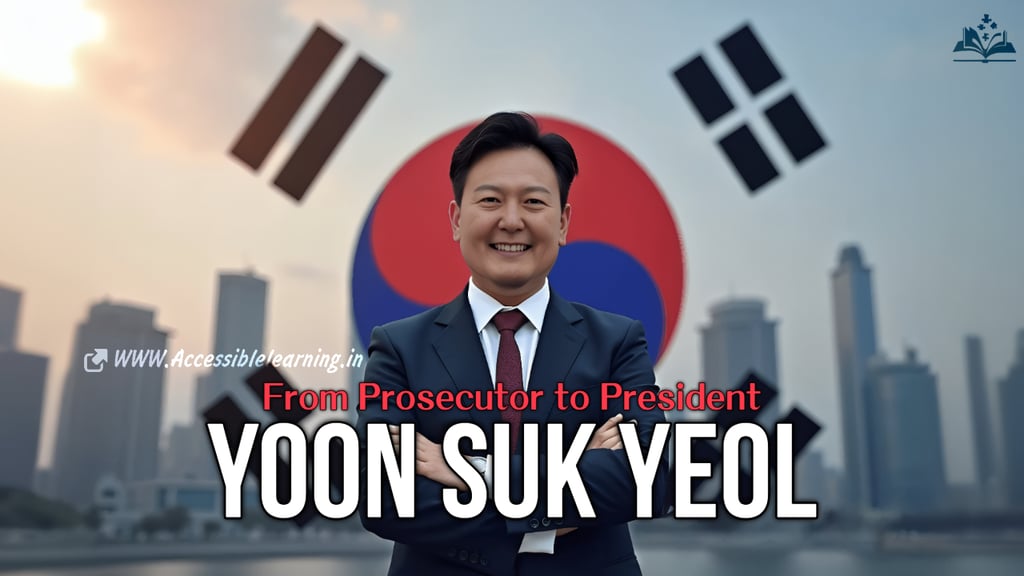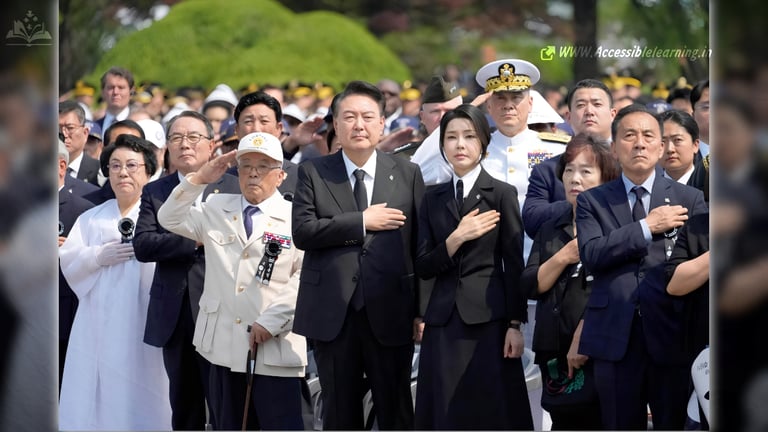
Yoon Suk Yeol’s Presidency: Domestic Reforms, National Security, and Global Relations!
The journey of Yoon Suk Yeol, South Korea’s 13th president, from his roots as a prosecutor to his rise to the presidency. This in-depth article covers his leadership style, key domestic and foreign policies, challenges, and the impact of his presidency on South Korea's future.
EDUCATION/KNOWLEDGEPOLITICAL JOURNEYBIOGRAPHYSOUTH KOREA
Kim Shin
1/28/20257 min read


Yoon Suk Yeol, the 13th President of South Korea, has quickly become a prominent figure in global politics since assuming office on May 10, 2022. His rise to power, marked by a blend of legal expertise and political acumen, is both a reflection of South Korea’s evolving political landscape and his personal commitment to restoring integrity and strong governance. This article provides an in-depth look at Yoon Suk Yeol’s life, his political journey, and his presidency thus far.
Early Life and Education
Yoon Suk Yeol was born on December 18, 1960, in Seoul, South Korea. He hails from a family with a strong educational and professional background, which undoubtedly influenced his determination to succeed in his chosen field. Yoon graduated from Seoul National University, South Korea’s most prestigious educational institution, with a degree in law in 1983. His academic excellence and interest in justice led him to a successful career in law, beginning with his passing of the highly competitive South Korean bar exam.
Legal Career: From Prosecutor to Reformist
Yoon’s legal career began in earnest when he joined the South Korean prosecution service in the 1980s. Over the years, he became known for his hard-hitting investigations into corruption and his commitment to holding the powerful accountable. His reputation as a fearless prosecutor was cemented during his involvement in high-profile cases that targeted corrupt politicians and business leaders.
One of the most notable aspects of Yoon’s career was his role in investigating former President Park Geun-hye, who was impeached in 2017. As the lead prosecutor, Yoon helped build the case against Park, leading to her conviction and subsequent imprisonment. His efforts earned him praise from many South Koreans who viewed him as a symbol of integrity and transparency within a political system often plagued by corruption.
In addition to his work on corruption cases, Yoon was also known for his stance on judicial independence and legal reforms. He became a key figure in the prosecution service’s push for greater autonomy, a reform that aligned with his broader commitment to strengthening the rule of law in South Korea.
Transition to Politics: The Presidential Bid
Yoon’s decision to enter politics came after his retirement from the prosecutor’s office in 2019. Despite his relatively late entry into the political arena, his legal background, strong stance on anti-corruption, and reputation as a reformist quickly garnered attention. In 2021, he formally declared his candidacy for president, running as a member of the conservative opposition party, the People Power Party (PPP).
Yoon’s presidential campaign was built around promises of restoring justice, combating corruption, and enhancing South Korea’s international standing. His platform was also focused on reinforcing South Korea’s security, particularly in relation to North Korea’s growing threat and its nuclear ambitions.
He was able to secure a narrow victory in the 2022 election, defeating his main rival, Lee Jae-myung of the progressive Democratic Party, in what was described as a highly competitive and divisive race. Yoon’s victory signaled a shift to the right in South Korean politics, with many voters expressing dissatisfaction with the ruling party’s handling of domestic and foreign affairs.
Presidency: Yoon Suk Yeol's Leadership Style and Policy Focus
Since taking office, President Yoon Suk Yeol has prioritized several key areas: domestic reform, national security, foreign policy, and economic development. His approach has been characterized by a firm stance on security issues, a strong desire to address corruption, and efforts to reshape South Korea’s international relations, particularly with the United States and Japan.
National Security and Foreign Policy
One of the primary challenges facing President Yoon is South Korea's relationship with North Korea. Yoon has taken a more hawkish stance toward Pyongyang, advocating for stronger military deterrence and a firmer response to North Korea's nuclear and missile tests. His administration has made efforts to strengthen the country’s defense capabilities and enhance alliances with the U.S. and other key international partners.
In terms of foreign policy, Yoon’s government has emphasized the importance of South Korea's role in the global community. His administration has worked to bolster relations with Western allies, especially the United States, while also seeking to improve ties with Japan. The president has expressed a desire to rebuild a strategic partnership with Japan, which has been strained by historical issues and territorial disputes. This shift in foreign policy underscores Yoon’s vision of South Korea playing a more prominent role on the global stage.
Additionally, Yoon's administration has supported the Indo-Pacific strategy, which seeks to strengthen South Korea's ties with countries like Australia and India. He has also shown a strong commitment to countering China's growing influence in the region, positioning South Korea as a leader in maintaining a rules-based international order. This commitment to security is further evidenced by Yoon’s advocacy for South Korea’s participation in initiatives like the Quad (the Quadrilateral Security Dialogue) and its increasing military cooperation with the U.S.


Domestic Policies: Economic Growth and Anti-Corruption Measures
On the domestic front, Yoon has focused on reviving South Korea’s economy after the challenges posed by the COVID-19 pandemic. His administration has pushed for economic policies aimed at enhancing growth, reducing income inequality, and improving job opportunities, particularly for younger generations. One of the key elements of his economic plan is so-called "economic democratization," which focuses on improving the financial sector’s transparency and implementing pro-market policies that encourage innovation and entrepreneurship.
Yoon’s government has focused on reducing the economic influence of chaebols (large family-owned conglomerates), which have historically held significant sway in South Korea’s economy. He has sought to introduce reforms that will increase competition, improve market fairness, and create a more transparent economic landscape.
Another core aspect of Yoon’s presidency is his commitment to fighting corruption and promoting transparency. As a former prosecutor, Yoon’s strong stance against corruption has resonated with many South Koreans. He has vowed to crack down on unethical practices within the government and corporate sectors, seeking to create a more accountable and transparent political environment.
Yoon has also been focused on addressing South Korea’s low birth rate, which is one of the country’s most pressing issues. The president’s government has introduced policies to encourage families to have more children, including expanded childcare benefits and efforts to reduce the financial burden of raising children. His administration is working to create a more family-friendly society by offering better work-life balance policies, especially in terms of parental leave and flexible working conditions.
His administration has also focused on revitalizing the housing market and offering affordable housing solutions for young South Koreans, who have been increasingly burdened by high property prices. Yoon's government is expected to continue working on these pressing domestic issues to maintain public support.
Social Issues and Public Perception
While Yoon’s leadership has been praised by many for its emphasis on law and order, his presidency has also been met with criticism, particularly regarding his handling of social issues. Some critics argue that his policies lean too heavily toward traditional conservative values, which may alienate younger, progressive voters. In particular, his approach to gender equality and LGBTQ rights has sparked debate, with some accusing him of not doing enough to support marginalized groups.
There has also been controversy over his handling of labor rights, with some labor unions criticizing his administration for its conservative stance on worker protections and labor reforms. Despite this, Yoon’s government remains focused on maintaining economic stability and encouraging greater productivity in the workforce.
Yoon’s approval ratings have fluctuated during his time in office, with public opinion often divided along political lines. His handling of major crises, such as the ongoing Covid-19 recovery and tensions with North Korea, will likely continue to shape his legacy.
Challenges Ahead for Yoon Suk Yeol
Balancing Domestic and International Priorities: Yoon must juggle domestic concerns—such as tackling income inequality, addressing the youth unemployment crisis, and resolving housing affordability—with his more prominent foreign policy agenda. Finding a balance between these priorities will be essential to his continued success.
Managing North Korea Relations: The North Korean threat remains a key concern. While Yoon has taken a tough stance, achieving peace and stability on the Korean Peninsula will require delicate diplomatic balancing with regional powers, including the U.S., China, and Russia.
Public Unification: South Korea remains deeply divided, with a significant ideological divide between conservative and liberal factions. Yoon’s ability to bridge this gap and promote unity will be critical in maintaining his legitimacy and securing future political stability.
Navigating Geopolitical Tensions: As the U.S.-China rivalry intensifies, South Korea must manage its relationship with both global powers. Yoon's administration will need to carefully navigate these tensions while safeguarding South Korea’s interests.
Dealing with Youth Discontent: One of the major challenges for Yoon’s government is the growing discontent among younger South Koreans, particularly those in their 20s and 30s, who feel the pressure of an uncertain job market, high housing costs, and stagnant wages. Addressing the needs of this demographic while maintaining the confidence of older generations will require nuanced policy shifts.


Yoon Suk Yeol’s presidency marks a new chapter in South Korea’s political history. With his background in law and his anti-corruption stance, he has built a platform focused on integrity, national security, and economic reform. However, the challenges ahead are significant, and the political landscape in South Korea remains highly polarized. As he navigates the complexities of governance, Yoon’s leadership will be closely scrutinized both domestically and internationally.
As South Korea faces global uncertainties and internal challenges, Yoon Suk Yeol’s presidency will continue to evolve, shaping the country’s future trajectory in the years to come. Whether his administration can achieve its ambitious goals will depend on his ability to unite a divided nation, balance economic priorities with social issues, and maintain South Korea’s role as a key player on the world stage.
Subscribe To Our Newsletter
All © Copyright reserved by Accessible-Learning Hub
| Terms & Conditions
Knowledge is power. Learn with Us. 📚


